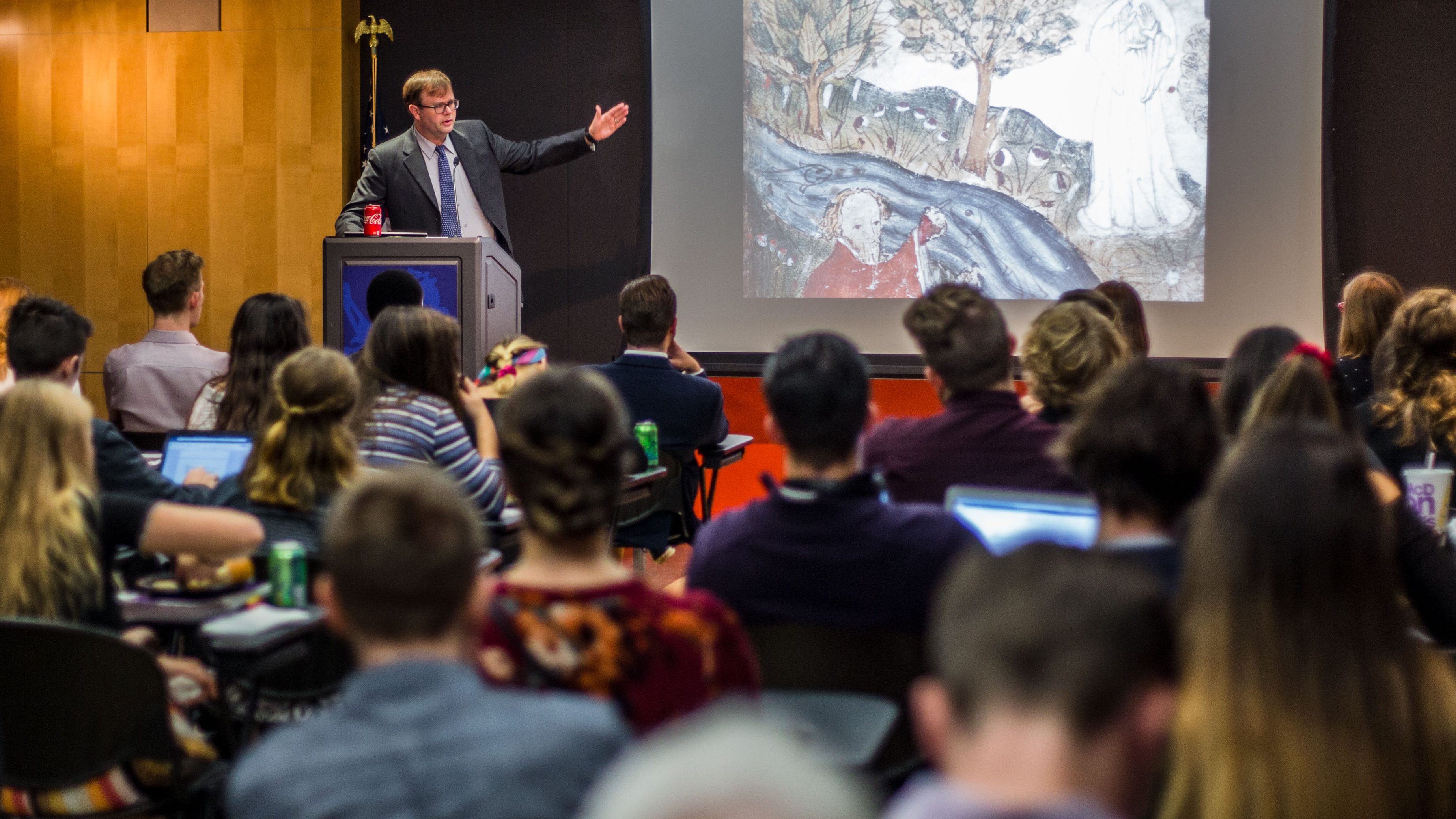Dr. Ethan Campbell Launches ‘The Gawain-Poet and the Fourteenth Century English Anticlerical Tradition’
Campbell’s book explores four Middle English works written by the same poet, finding an intentional reproach against the immorality and corruption of medieval clerics.

On September 14, The King’s College welcomed Dr. Ethan Campbell, associate professor of English and literature and coordinator of the English major, to discuss his newest book, The Gawain-Poet and the Fourteenth-Century English Anticlerical Tradition. Campbell’s book explores four Middle English works of unknown authorship: Pearl, Cleanness, Patience, and the celebrated Sir Gawain and the Green Knight. In each of these, Campbell finds an intentional reproach against the immorality and corruption of medieval clerics.
Explaining his method, Campbell drew particular attention to the Biblical foundations of the Gawain-poet’s narratives, as well as certain telling deviations from the original. For instance, the poem Patience is essentially a retelling of the book of Jonah. “Who remembers,” Campbell asked rhetorically, “why Jonah fled from God when asked to preach in Nineveh? It’s a trick question. The next line in the Bible is, ‘Jonah ran away.’” However, in Patience, Jonah replies that he fears for his own safety. Situating this poem within the anticlerical tradition accounts for the discrepancy. Jonah’s reply can be seen as an allusion to the cowardice of bishops who refused, despite their clerical obligations, to risk journeying to the dangerous Holy Land.
Campbell also referred to anticlerical critiques in the works of the Gawain-poet’s contemporaries, including Geoffrey Chaucer, John Wyclif, William Langland, and others. Alarmed by the hypocritical behavior of priests and bishops, these authors feared that such transgressions might incur the wrath of God. Still, these medieval writers did not necessarily reject religion itself. To demonstrate this, Campbell read aloud—reading the text with its original Middle English pronunciation—a selection from Chaucer’s The Wife of Bath’s Tale, in which the Wife of Bath laments the loss of “fayeries” from the forests of England’s pagan past, and denigrates the less-than-holy friars who replaced them. Yet, she also concedes that the forest paths were far more dangerous before the Church civilized England and brought the rule of law.
During the Q&A portion of the event, veterans of Campbell’s literature classes inquired about the role of the anticlerical tradition in Shakespeare’s plays. Campbell affirmed that the anticlerical theme is fertile ground for further scholarship, and encouraged students to take his class on Shakespeare, which will be offered in the spring semester.
Dr. Bleattler, chair of the program in Media, Culture, and the Arts, said, “It’s always good for our students to see their professors engaging with the broader world of scholarship. And though some might think the study of medieval English literature lacks resonance for today’s culture, they would be wrong. As Dr. Campbell made clear to a packed room of students, staff, and faculty, many of our current societal tensions, whether in our personal relationships or with church leadership, are not new.” The anticlerical tradition certainly remains both controversial and pertinent in light of sexual abuse scandals in the Church.
Throughout his presentation, Campbell’s deep respect and appreciation for his source material was evident. Campbell’s playful jab at the original, childlike illustrations in the manuscript drew laughs from the audience, though he ultimately juxtaposed this artistic shortcoming with the genuine excellence of the Gawain-poet’s verse. Campbell even noted that his sustained study of Patience contributed to the naming of his son, Jonah, whose photo found its way into one of the PowerPoint slides. “How did that get there?” Campbell asked with a smile.
The Gawain-Poet and the Fourteenth-Century English Anticlerical Tradition is available for purchase through Medieval Institute Publications, an academic press at Western Michigan University.




